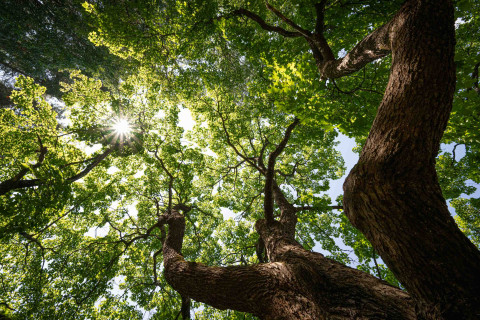Annalisa Savaresi studies how to bring about change so that people embrace and support it.
- Text: Terhi Suominen | Images: Niko Jouhkimainen
“Students nowadays are very concerned about the state of the environment. This has always been the case with students in environmental law, but it’s fair to say there is a greater sense of urgency today about the potentially catastrophic outcomes that scientists are increasingly warning us about.”
Annalisa Savaresi, the University of Eastern Finland’s newly appointed Professor of International Environmental Law, has seen the change in how students see the future. Young people are much more concerned about the planet than they were 10 to 15 years ago, she says. Empowering the next generation to tackle environmental challenges is a strong motivation in her job as a professor.
“What I love about my job is that I feel like I can make change happen and that is really empowering. It gives you a kick when you see your students go on and litigate important climate lawsuits all over the world,” Savaresi says.
Environmental law is an evolving field that studies a wide range of topics that focus on protecting the environment, human health and natural resources.
“The mainstreaming of environmental concerns across all sectors of society underscores the urgent need to train more environmental lawyers. It’s essential that environmental law becomes integrated into legal practice rather than remaining on the fringes.”
Savaresi has taught and researched environmental law since starting her PhD at the University of Copenhagen in 2009. Before joining the University of Eastern Finland, she worked at the Universities of Edinburgh and Stirling in the United Kingdom. Savaresi joined the Center for Climate, Energy, and Environmental Law (CCEEL) at the University of Eastern Finland’s Law School as an associate professor in 2021. CCEEL has rapidly become one of the largest research centres dedicated to the study of climate, energy and environmental law in the world.
What I love about my job is that I feel like I can make change happen. It gives you a kick when you see your students go on and litigate important climate lawsuits all over the world.
Annalisa Savaresi
Professor of International Environmental Law

Do climate lawsuits make a difference?
Savaresi’s current research focuses on the enforcement of environmental law, particularly within the context of climate change. Climate lawsuits have made headlines this spring, as the European Court of Human Rights ruled that Switzerland had violated human rights by failing to adequately combat climate change.
“The court’s finding that failure to comply with climate law targets and lack of credible plans to reduce emissions constitute human rights violations is highly significant,” Savaresi says.
The Swiss case provides a framework for arguing future and pending cases all over the world.
“More importantly, it shows that courts are poised to demand the proper enforcement of climate change laws and alignment with the temperature goal enshrined in the Paris Agreement.”
Savaresi underscores how addressing the climate crisis necessitates international collaboration, bringing together researchers from diverse disciplines. Presently, she is working with scientists at the London School of Economics to analyse the impacts of climate litigation in Europe, as part of the RETOOL project.
Savaresi highlights that assessing the impact of climate lawsuits extends far beyond legal analysis, calling for interdisciplinary collaboration.
“Funded by Horizon Europe, RETOOL aims to advance our understanding of how to address the twin challenges of responding to the climate imperative while strengthening and reinvigorating democratic governance,” Savaresi says, describing her current project.
Getting hands-on: making change happen
Change is a strong theme also in Savaresi’s long-standing research interest in the law concerning greenhouse gas emissions from land use, such as forestry and agriculture. This is an important field in Finland and the whole of the EU, where the regulation of land uses faces a lot of resistance.
It’s important to pass on the knowledge about what works, and try and understand how you can make those success stories happen elsewhere.
Annalisa Savaresi
Professor of International Environmental Law
“This is an area where law is important, but where it is also crucial to work with social scientists, to understand where the opposition comes from, and why and how we can overcome it,” Savaresi says.
She is interested in how to bring about change so that people embrace it and support it. She notes how in the UK and elsewhere, pilot projects have been run to train farmers to do things in a different way. The results have been encouraging.
“If you want to revolutionise consolidated practices within society, you really have to roll your sleeves up and consider not only economics, but also socio-cultural factors.”
Savaresi believes that change is possible, and that her field of research will be an essential part of it.
“It’s easy to be pessimistic, but the truth is that we have a long history of practice, including things that have worked. So, it’s important to pass on the knowledge about what works, and try and understand how you can make those success stories happen elsewhere.”
ANNALISA SAVARESI
Professor of International Environmental Law, University of Eastern Finland, 1 March 2024–
- PhD in Law, Faculty of Law, University of Copenhagen, 2013
Key roles
- Professor of Environmental Law, University of Stirling (part-time), 2023–
- Board Member, Environmental Standards Scotland, 2021–
- Director for Europe, Global Network for Human Rights and the Environment 2018–
- Member, World Commission on Environmental Law, International Union for the Conservation of Nature, 2009–
